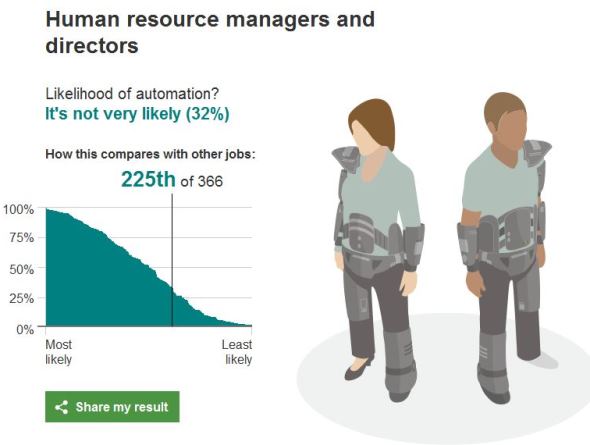The BBC has a fun interactive tool that allows you to look up your job title and find out how soon your job is likely to be taken over by robots. They report that about 35% of all jobs in the UK are at high risk of being taken over by some form of automation over the next 20 years.
The data behind the tools was extracted from ‘The Future of Employment: How susceptible are jobs to automation,’ a report by Michael Osborne and Carl Frey, from Oxford University’s Martin School. Figures on UK job numbers and average wages from the Office for National Statistics and Deloitte UK.
“The research was originally carried out using detailed job data from the United States O*NET employment database. The analysis for UK jobs was made by adapting the findings to corresponding occupations in the UK based on Office for National Statistics job classifications. For the purpose of the UK study, some US occupations were merged. In these cases, the probabilities were calculated as weighted averages of the probabilities of automation for each US occupation within the group.”
We’ve taken a look at Human Resource Managers & Directors and there is relatively good news – the likelihood of your job being automated is fairly low.
“Certain aspects of a job are simpler to automate than others.
Social workers, nurses, therapists and psychologists are among the least likely occupations to be taken over as assisting and caring for others, which involves empathy, is a crucial part of the job.
Roles requiring employees to think on their feet and come up with creative and original ideas, for example artists, designers or engineers, hold a significant advantage in the face of automation.
Additionally, occupations involving tasks that require a high degree of social intelligence and negotiating skills, like managerial positions, are considerably less at risk from machines according to the study.”
You can look up the title to find more detail on this or other jobs.
So while you may not have to worry about having your HR job replaced by robots, you may need to learn how to manage a workforce that is part human, part machine.
Most of the robotics and automation that we’ve seen in the workplace so far have relied on human intervention to program them – but hang on to your hats, because we will be entering a new era of artificial intelligence in which robots will “think” and learn on their own – creating new workplace challenges.
Here’s some reading to ready you for these new workforce developments:
Robotics in the Workplace: Helping Hands?
“Robotics will forever change the landscape of the U.S. workplace. That may create new liability concerns and eliminate others.”
How to Manage Robots and People Working Together
“Humans almost inevitably will treat the machines as living things. So companies need to prepare for all sorts of social issues that might crop up.”
How robots will transform your workplace
“A wide range of sectors will benefit from the resource and capability that robots can bring – and it won’t necessarily equate to a loss of jobs”
Why 2015 Was a Breakthrough Year in Artificial Intelligence
“Computers are “starting to open their eyes,” said a senior fellow at Google.”
We leave you with a look at what your new workforce may look like: Meet Atlas from Boston Dynamics, a robot designed to operate outdoors and inside buildings.

